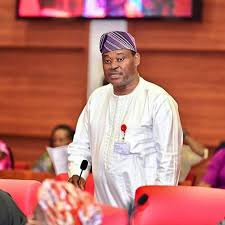The Senator representing Ondo South in the National Assembly, Jimoh Ibrahim, on Saturday urged the Federal Government of Nigeria address the hunger in the country.
Ibrahim stressed the need for the Government to create food vouchers for poor Nigerians as part of efforts to address the widespread hunger in the nation.
The Senator disclosed this during a press briefing on the sidelines of the IMF/World Bank meetings in Washington DC.
According to PREMIUM TIMES those present at the press conference included the Central Bank of Nigeria, CBN Governor, Olayemi Cardoso. Also present were the Minister of Finance, Wale Edun, and other top Government officials.
Addressing the press, Ibrahim stated that the food vouchers will be more effective in addressing the hunger crisis ravaging the nation. He said the cash transfer initiative being implemented by the government is not effective.
According to him, the move would help “remove 20 million Nigerians suffering from hunger” due to food insecurity.
He said, “This is a harmonious policy. And when it’s done, it will help the Government to have a direct impact on those who are affected by poverty and food insecurity.”
Recall that President Tinubu administration has, in recent months, implemented reforms it says were aimed at recalibrating the economy and fixing structural distortions.
This is coming on the heels of the Government’s removal of subsidies on petrol and unification the various windows of the foreign exchange market. Also, there have equally been reforms in the nation’s power sector, with an attendant increase in electricity tariff.
Recall also that the International Monetary Fund, IMF and World Bank have for several years called for these key reforms. These they had said will engender growth and drive economic progress in the country.
With the removal of the petrol subsidy and unification of the forex, many Nigerians have been passing through economic depression. This is even as prices of food items have gone beyond the reach of average Nigerians.
The twin polices of subsidy removal and the devaluation of the Naira have ignited the nation’s inflation rate.
According to reports, Nigeria’s annual inflation rate rose in September after recording a two-month consecutive fall.
According to the National Bureau of Statistics, NBS, the headline inflation rate in September was 32.70 per cent. That was in relation to the August 2024 headline inflation rate of 32.15 per cent,
“The food inflation rate in September 2024 was 37.77 per cent. That is 7.13 percentage points higher than the rate recorded in September 2023 (30.64 per cent),” NBS stated.
NBS stated that the rise in food inflation on a year-on-year basis was caused by increases in prices of food items. It gave the following items as guinea corn, rice, maize grains, beans, etc (bread and cereals class). Yam, water yam, cassava tuber, etc (potatoes, yam & other tubers class). Beer (local and foreign). Lipton, milo, bournvita, etc (coffee, tea & cocoa class) and vegetable oil, palm oil, etc (oil & fats class).
Speaking at the press conference, Ibrahim said the food voucher initiative would curb the corruption that often taints palliative programmes. This is because it will eliminate the aspect of cash management.
“It’s very important because when you don’t solve the problem of food and hunger, then you are looking for crisis. That’s why we are saying that the economic policy of the CBN and the Ministry of Finance should be harmonized. And then, we can have a clear account to print vouchers for food,” he said.
Recall that in August, a nationwide protest against bad governance was staged across States of the Federation. The protest, with hashtag #EndBadGovernanceinNigeria, was staged to call the Federal Government’s attention to the economic hardship facing Nigerians.
Earlier on Friday, IMF, urged the Nigerian Government to direct savings realized from subsidy removal to the poor and vulnerable population in the society.
This was contained in statement by the head of the IMF’s African Department, Abebe Selassie, at the regional economic outlook for sub-Saharan Africa press conference.
“Some of the savings from the fuel subsidy reforms and Forex subsidy being removed should now be directed to help cushion the effects on the most vulnerable households,” Selassie said.
source: Premium Times
Follow us for more news on our WhatsApp News Channels @
https://whatsapp.com/channel/0029VaC505jB4hdZ5Yx9g82U
![]()

